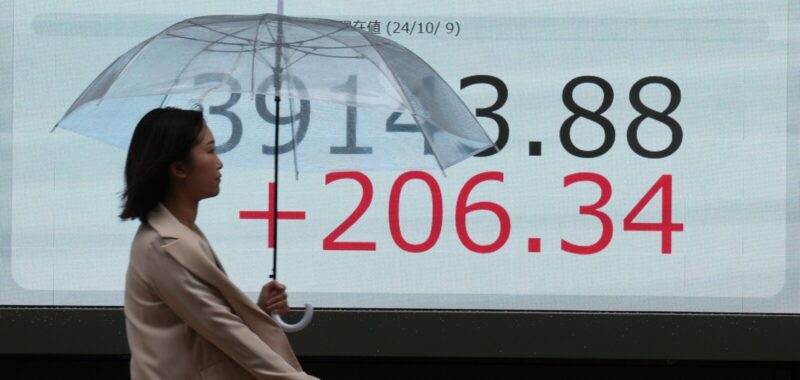HONG KONG — Stocks in China slumped on Wednesday, with Shanghai’s benchmark down 6.6% and Hong Kong’s losing 1.5% as investors dumped shares to lock in profits after recent rallies driven by hopes for major economic stimulus.
Other Asian markets rose, while U.S. futures fell back. Oil prices advanced.
Details of economic stimulus plans from officials in Beijing have failed to live up to lofty expectations that had built up after the central bank and other government agencies announced various policies to help revive the ailing property market and spur faster economic growth.
The moves announced in late September fueled a rally that has since fizzled. A news conference by the Finance Ministry due to be held on Saturday could provide further details on government spending that so far have fallen short of what investors have been hoping for.
The Shanghai Composite lost 6.6% to 3,258.86 after it gained 4.6% Tuesday as it reopened from a weeklong national holiday. The CSI300 Index, which tracks the top 300 stocks traded in the Shanghai and Shenzhen markets, gave up 6.2%.
The benchmark in the smaller market in Shenzhen dropped 8.1%.
Hong Kong’s Hang Seng index shed 1.6% to 20,593.98. That followed a plunge of more than 9% on Tuesday.
“A lack of new stimulus has been the cause of disappointment, with many market participants hoping that its fiscal policies will follow in the footstep of the financial ‘bazooka’ delivered in late-September, but there was clearly a step-down in yesterday’s announcement,” Yeap Jun Rong of IG said in a commentary.
The Shanghai Composite is still up 5.2% from a year ago and more than 10% in the past three months. Hong Kong’s index is up nearly 18% from a year earlier.
In Tokyo, the Nikkei 225 index advanced 0.9% to 39,277.96. Shares of the Japanese retailer Seven & i Holdings gained 4.7% after media reported that Canadian convenience store operator Alimentation Couche-Tard had increased its takeover bid by about 20%.
Japan’s parliament was due to be dissolved on Wednesday to pave the way for a general election. Prime Minister Shigeru Ishiba is seeking to consolidate support after taking office last week, amid signs the Liberal Democrats’ ruling coalition remains shaky after Ishiba’s predecessor, Fumio Kishida, stepped down following a slew of scandals among the party’s lawmakers.
Australia’s S&P/ASX 200 gained 0.1% at 8,187.40. South Korea’s markets were closed for a public holiday.
On Tuesday, the S&P 500 rallied 1% to 5,751.13. The Dow Jones Industrial Average rose 0.3% to 42,080.37, while the Nasdaq composite led the way with a 1.4% rally to 18,182.92.
The 10-year Treasury yield edged down to 4.02 from 4.03% late Monday. The two-year yield, which more closely tracks expectations for what the Federal Reserve will do with overnight interest rates, slipped to 3.96% from 3.99%, late Monday, though it’s still near its highest level since August.
When Treasurys are paying higher yields, investors generally become less willing to pay very high prices for stocks and other investments. And Treasury yields had been storming higher over the last week following a suite of reports showing the U.S. economy remains healthier than expected.
Such reports, including one last week showing stronger hiring by U.S. employers than forecast, raise hopes that the economy will avoid a recession. But they also force traders to ratchet back expectations for how much the Federal Reserve will cut interest rates by, now that it has widened its focus to include keeping the economy humming instead of just fighting high inflation.
Oil prices extended gains as Hezbollah fired another barrage of rockets into Israel on Tuesday which heightening concerns over escalating tensions in the Middle East. Benchmark U.S. crude oil added 54 cents to $74.11 per barrel. Brent crude, the international standard, rose 64 cents to $77.82 per barrel.
In currency trading, the U.S. dollar edged up to 148.38 Japanese yen from 148.20 yen. The euro fell from $1.0959 to $1.0970.

